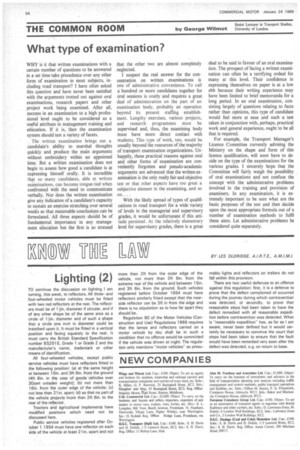What type of examination?
Page 58

If you've noticed an error in this article please click here to report it so we can fix it.
WHY is it that written examinations with a certain number of questions to be answered in a set time take precedence over any other form of examination in most subjects, including road transport? I have often asked this question and have never been satisfied with the arguments trotted out against oral examinations, research papers and other project work being examined. After all, success in an examination to a high professional level ought to be considered as a useful attribute in management training and education. If it is, then the examination system should test a variety of facets.
The written examination brings out a candidate's ability to marshal thoughts quickly and produce the main arguments without embroidery within an appointed time. But a written examination does not begin to assess how good a candidate is at expressing himself orally. It is incredible that so many candidates, able at written examinations, can become tongue-tied when confronted with the need to communicate verbally. Nor does the written examination give any indication of a candidate's capacity to sustain an exercise stretching over several weeks so that reasonable conclusions can be formulated. All three aspects should be of fundamental importance in any management education but the first is so stressed that the other two are almost completely neglected.
I suspect the real answer for the concentration on written examinations is one of administrative convenience. To call a hundred or more candidates together for oral sessions is costly and requires a great deal of administration on the part of an examination body, probably an operation beyond its present staffing establishment. Lengthy exercises, various projects, and research programmes must be supervised and, thus, the examining body must have more direct contact with students. This type of work, too, would be usually beyond the resources of the majority of transport examination organizations. Unhappily, these practical reasons against oral and other forms of examination are conveniently forgotten and pseudo-academic arguments are advanced that the written examination is the only really fair and objective test or that other aspects have too great a subjective element in the examining, and so on....
With the likely spread of types of qualifications in road transport for a wide variety of levels in the managerial and supervisory grades, it would be unfortunate if this attitude persisted. At the relatively elementary level for supervisory grades, there is a great deal to be said in favour of an oral examination. The prospect of facing a written examination can often be a terrifying ordeal for many at this level. Their confidence in expressing themselves on paper is at a low ebb because their writing experience may have been limited to brief memoranda for a long period. In an oral examination, consisting largely of questions relating to facts rather than opinions, this type of candidate would feel more at ease and such a test taken in conjunction with, perhaps, practical work and general experience, ought to be all that is required.
For example, the Transport Manager's Licence Committee currently advising the Ministry on the shape and form of this licence qualification, will soon have to decide on the type of the examinations for the various grades. I sincerely hope that the Committee will fairly weigh the possibility of oral examinations and not confuse the concept with the administrative problems involved in the training and provision of examiners. In any examination, it is extremely important to be sure what are the basic purposes of the test and then decide upon the most appropriate formula out of a number of examination methods to fulfil these aims. Let administrative problems be considered quite separately.








































































































